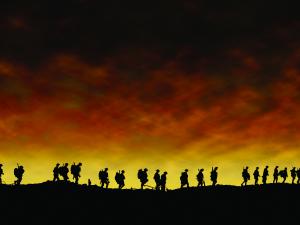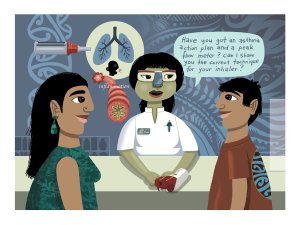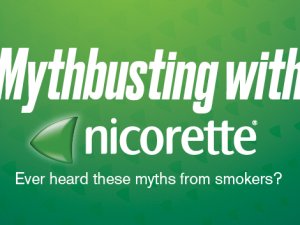Academic pharmacist Nataly Martini discusses the medical management of asthma in adults and adolescents, which has evolved to prioritise early anti-inflammatory treatment. She also explains how to improve patient outcomes by proactively identifying poor asthma control and supporting equitable access to education and treatment
ON THE FRONT LINE
ON THE FRONT LINE

Pharmacist Lieutenant William Lusher is part of a tri-service medical unit supporting the country’s armed forces. He talks to Natasha Jojoa Burling about work, exercise and the importance of maintaining healthy relationships
Not many pharmacists have to guard army camps or do physical training, but that’s all part of William Lusher’s job. UK-born Lieutenant Lusher is the only full-time uniformed officer working as a pharmacist in the New Zealand Defence Force. He’s been in the army for three years, joining just before COVID-19.
Lieutenant Lusher works at the country’s largest army base, Linton Military Camp, but lives with his partner in Palmerston North. His title is pharmacist officer, and he’s part of the Deployable Health Organisation, a tri-service medical unit supporting New Zealand’s army, navy and air forces.
The job is varied, but like other pharmacists, he focuses on the safe and effective use of medicines, optimising them where possible. He ensures medics, nurses, doctors and medical personnel get their supply of medicines, provides medicines information and helps with tracking and writing new standing orders. Giving pharmaceutical advice is also part of the role, as well as supplying the surgical team, who work in combat situations, with medicines. Making sure people comply with medicines handling and rules, such as cold chain, and being a point of contact and subject-matter expert are also important.
Lieutenant Lusher helped take COVID-19 vaccinations to Tokelau and the northern Cook Islands from 12 July to 6 August 2021 as part of Operation Pacific Vaccinate.
I think we’re in the middle of a period of change. The systems we use in New Zealand are backwards. In the UK, most dispensing is done in a warehouse and sent to pharmacies, where the counselling is done
Tell us a little about yourself?
I was born in the UK, moved to Whangārei with my family when I was 10 and now live in Palmerston North with my partner of 10 years, Alice, and our cat Turbo. I love mountain biking, especially on the tracks outside Palmerston North, such as Arapuke Mountain Bike Park.
How do you start your day?
I pretty much always have a cup of coffee to get me going. I usually start work at 7.30am. Normally, the first thing I do is fire up my computer to see if there are any emails. Usually, we have unit physical training at 3pm, so I have to try and make sure I have everything done before that.
What is the most underrated product in your pharmacy?
Sunblock or chapstick. If you are training in the field and are going to be in the sun all day, in the words of Australian film director Baz Luhrmann, “wear sunscreen”. In initial [military] training, most people come back with their hands completely brown because they’ve spent so much time outside. Their hands are a completely different colour from the rest of their bodies.
What are you most proud of professionally?
It’s hard to think because I have done a few jobs. Every time I leave, people seem to be sad to see me go though. When you’re in the thick of the job, you don’t stop and think. There’s no one thing I could pinpoint; I think it’s just turning up and doing the work.
What’s the one thing the pharmacy sector could do better?
They could train interns better. I was lucky with my internship because it was really structured and I was super-educated, which set me up for success. However, I hear stories of interns being sent out the back to do blister packs and vaccinations. Some pharmacies don’t spend time doing things well. We have Evolve intern training, but most of the training is done on the job.
In your opinion, what’s the next big thing in pharmacy?
Automation and a proper rollout of electronic prescribing. I think we’re in the middle of a period of change. The systems we use in New Zealand are backwards. In the UK, most dispensing is done in a warehouse and sent to pharmacies, where the counselling is done.
What’s the thing you most like about your workplace?
Hands down, the people I work with, followed closely by training and development and the variety in my work.
What’s the most problematic aspect of pharmacy?
Just retaining people. I’m kind of out of the loop because I have found a niche I enjoy. During my talks to university students, I say, “Don’t be afraid to try new things. Don’t think you have to stay in one place too long. If you liked something, don’t be afraid to go back. Try and find out what works for you.”
What takes up too much of your time?
Probably just destroying heatexposed medicines. During training in Waiōuru, you could feasibly have a day that goes from zero to 30°C. Many standards for handling medicines are targeted at hospitals and pharmacies, which are airconditioned. I give them to medics so they get hot, rained on, carried around in backpacks and bashed around. Unfortunately, I have to destroy a lot of stuff because I can’t guarantee its safety once it’s been out and about.
What’s the weirdest question you’ve been asked by a patient/customer?
The question that annoys me most is, “What’s your favourite drug?”
What are the three things you couldn’t do without personally or professionally?
I couldn’t do without a bicycle for a very long time. I also couldn’t do without my partner; I should probably put that first. In general, just good colleagues mostly.
Who do you admire?
I’ve been very fortunate to be surrounded by very supportive people who’ve helped me along the way. I admire anyone who does the right thing but I would rather not name individuals because there are so many, and I wouldn’t want to leave people out. I still have a lot of appreciation for Jess Nand, who was my preceptor at North Shore Hospital and was very helpful.
How did you mark ANZAC Day this year?
I commemorated ANZAC Day with my unit, the Deployable Health Organisation, in Feilding. It was nice to commemorate as a collective. In previous years, we have done the stand at dawn outside our homes while listening to a service on the radio. This was good experience for personal reflection and making the most of a bad situation, but coming together is much nicer.
What’s your favourite 3pm snack?
Plain toast with butter.
What’s your favourite pastime outside of work?
That’s easy: mountain biking.
What would you do if you weren’t a pharmacist?
I would probably join the army or look into doing engineering.







